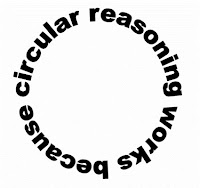For example, some Christians have wrongly argued this way:
Skeptic: How do you know God exists?
Christian: Because the Bible says He does.
Skeptic: How do you know the Bible is true?
Christian: Duh! It's the Word of God!
Notice in this dialogue the Christian is assuming that God exists and wrote the Bible in order to prove that God exists. This commits the logical fallacy known as "begging the question." The arguer cannot assume the truthfulness of the conclusion he is attempting to prove.
However, non-Christians are just as prone to logical fallacies and the following are some common examples.
"Miracles Can't Happen."
Well known Scottish skeptic David Hume stated in On Miracles, "A miracle is a violation of the laws of nature; and as a firm and unalterable experience has established these laws, the proof against a miracle, from the very nature of the fact, is as entire as any argument from experience can possibly be imagined" (My emphasis).
Unfortunately Hume is begging the question. Notice he makes the claim that a firm and unalterable experience counts against the belief in miracles. In other words, testimony and experience count 100 percent against miracles! But how would Hume know this? C.S. Lewis addresses this nicely in his book Miracles:
Now of course we must agree with Hume that if there is absolutely "uniform experience" against miracles, if in other words, they have never happened, why then they never have. Unfortunately, we know the experience against them to be uniform only if we know that all the reports of them are false. And we can know all the reports of them to be false only if we know already that miracles have never occurred. In fact, we are arguing in a circle.
"Jesus Never Existed."
Another example of circular reasoning can be seen in the claim made by some skeptics that "Jesus never existed." Given the ample amount of historical evidence for the life of Christ, how could anyone ever support the claim that Jesus never existed? The only way you could show that Jesus never existed is to prove that every account of Jesus that exists is false. Of course the only way you could prove that every existing account of Jesus is false is if you knew He never existed in the first place! This begs the question.
Abortion
The entire abortion debate centers around one question: What is the unborn? Many arguments in favor of the pro-abortion choice position beg the question by assuming the unborn is not a human being.
For example, some pro-abortion choice advocates argue that "A woman has the right to do what she wants with her own body." This begs the question by assuming the woman's body is the only one involved. If the unborn is a human being there are two human beings and two human bodies involved. Furthermore, it is never the woman's body that gets aborted. The woman survives the abortion, the unborn doesn't.
Conclusion: If all else fails, remember this: circular reasoning works because circular reasoning works because circular reasoning works because circular reasoning works...





